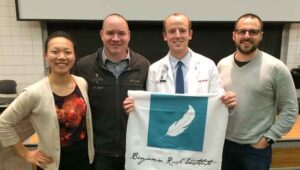Geisel School of Medicine at Dartmouth — Dartmouth Open House: Meet Benjamin Rush Institute!
Dartmouth Hitchcock Medical Center, Auditorium A-D 1 Medical Center Dr, Lebanon, NH, United StatesDartmouth Open House
The Medical College of Wisconsin BRI chapter is proud to screen Poverty, Inc. to students and faculty. It is a bold look at “the business of doing good.” Please join us for refreshments and lively discussion following the film.

From the film's website:
"The West has positioned itself as the protagonist of development, giving rise to a vast multi-billion dollar poverty industry — the business of doing good has never been better. Yet the results have been mixed, in some cases even catastrophic, and leaders in the developing world are growing increasingly vocal in calling for change. Drawing from over 200 interviews filmed in 20 countries, Poverty, Inc. unearths an uncomfortable side of charity we can no longer ignore."
Dr. Beth Haynes, MD, BRI executive director, will speak on poverty as the major determinant of health, and how markets are the best way to alleviate poverty. Lunch will be provided.
Do you think you know enough about government-run healthcare? Free market healthcare? Ohio State University College of Medicine BRI chapter and Students for a National Health Program (SNaHP) cordially invite you to attend our debate wherein free markets will be pitched head on against federal government, single payer healthcare programs. Which system provides the best solutions for the most people at the best prices? Which takes better care of the doctor-patient relationship? Which is more efficient?
We will be showing the movie Code Black to students at Rosalind Franklin to help them gain a better understanding of the healthcare environment and how our current health policies affect doctors on a daily basis.
Join us for snacks and appetizers following the film!
The University of Delaware BRI chapter is proud to screen Poverty, Inc. to students and faculty. It is a bold look at “the business of doing good.” Please join us for refreshments and lively discussion following the film.

From the film's website:
"The West has positioned itself as the protagonist of development, giving rise to a vast multi-billion dollar poverty industry — the business of doing good has never been better. Yet the results have been mixed, in some cases even catastrophic, and leaders in the developing world are growing increasingly vocal in calling for change. Drawing from over 200 interviews filmed in 20 countries, Poverty, Inc. unearths an uncomfortable side of charity we can no longer ignore."
01/22/15 Guest Dr. Richard Armstrong, M.D., BRI Board member and Docs4PatientCare Foundation treasurer.
Richard Armstrong, MD FACS joins host Mike Koriwchak, MD to discuss the shifting tides motivating doctors to finally start paying attention. Much of a reflection of the larger American public, more and more of the 800,000 plus physicians in America are awaking to the impact of ObamaCare on the practice medicine.
Dr. Beth Haynes, BRI executive director, delivers a talk at ATLAS Summit 2016 @ Freedom Fest: What Insurance Is and Isn't—Getting Medical Costs Under Control.
There is much talk about how to control medical costs. Medical inflation continues to outpace general inflation. Why this is happening has much to do with the fact that what is called "health insurance" really isn't insurance. We argue that coerced wealth distribution is immoral, but this argument does not resonate with everyone. Being abel to also argue the economic aspects of healthcare can strengthen your ability to make the case for freedom in medical care. Come learn about the nature of insurance, what it is and isn't, why current health policy is doomed to fail, and what better alternatives exist.
Dr. Beth Haynes, BRI executive director, delivered a talk at ATLAS Summit 2016 @ Freedom Fest: Engaging Our Future Physicians.
It is important that we undertake the task of engaging our future physicians. What are they learning about health policy? Given the state of higher education today, it's no surprise that health policy instruction at medical schools is government-centric. But what is surprising is how little formal policy instruction students receive, which presents a great opportunity to interject the voice of reason into the conversation. Benjamin Rush Institute is doing exactly that. In just the fall semester of 2016, we reached 1300 medical student5s. Come hear how we are presenting the ideas of individual rights and limited government in a way that even liberal medical students are wiling to consider these alternatives.
Dr. Beth Haynes, BRI executive director delivered a talk at the 2016 ATLAS Summit @ Freedom Fest, What About the Poor? How to Win the Debate Without Selling Your Soul.
In order to engage those who are skeptical but potentially persuadable to free market ideas, we need to answer concerns about what happens to society's most disadvantaged in a powerful, truthful and compelling way. This is a major concern of young people, who frequently have a strong desire to help others, but who are typically economically ignorant and think with their hearts. In order to reach them we need to address their concerns without compromising on our fundamental principles. Come learn what tactics are working with students and are applicable to a much broader audience.


 The Marian University College of Osteopathic Medicine-Benjamin Rush Institute (BRI) chapter welcomes you to find out about our organization and get involved! BRI's purpose is to fully unleash the power of medicine to maximize human health and well-being. We do this by holding events during the academic year: debates, journal club meetings, lunch lectures, movie screenings—(yes, we always serve food!) to help spread the exchange of ideas about healthcare innovation, improvements in healthcare policy, and simply networking as caring medical students.
The Marian University College of Osteopathic Medicine-Benjamin Rush Institute (BRI) chapter welcomes you to find out about our organization and get involved! BRI's purpose is to fully unleash the power of medicine to maximize human health and well-being. We do this by holding events during the academic year: debates, journal club meetings, lunch lectures, movie screenings—(yes, we always serve food!) to help spread the exchange of ideas about healthcare innovation, improvements in healthcare policy, and simply networking as caring medical students.


 The Ohio University Heritage College of Osteopathic Medicine-Benjamin Rush Institute (BRI) chapter welcomes you to find out about our organization and get involved! BRI's purpose is to fully unleash the power of medicine to maximize human health and well-being. We do this by holding events during the academic year: debates, journal club meetings, lunch lectures, movie screenings—(yes, we always serve food!) to help spread the exchange of ideas about healthcare innovation, improvements in healthcare policy, and simply networking as caring medical students.
The Ohio University Heritage College of Osteopathic Medicine-Benjamin Rush Institute (BRI) chapter welcomes you to find out about our organization and get involved! BRI's purpose is to fully unleash the power of medicine to maximize human health and well-being. We do this by holding events during the academic year: debates, journal club meetings, lunch lectures, movie screenings—(yes, we always serve food!) to help spread the exchange of ideas about healthcare innovation, improvements in healthcare policy, and simply networking as caring medical students.